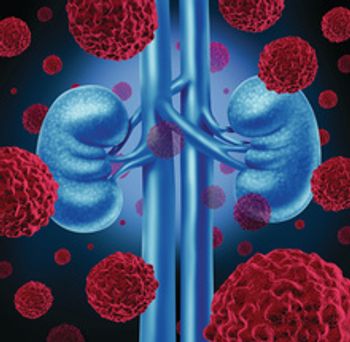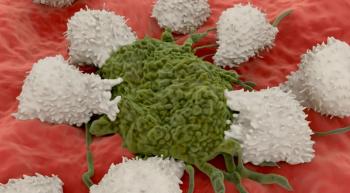
Phase 3 KEYNOTE-564 trials demonstrated that single-agent pembrolizumab resulted in improved DFS in comparison to placebo group.

Kristi Rosa joined MJH Life Sciences in 2016 and has since held several positions within the company. Prior to working at the company, she served as lead copywriter and marketing coordinator at The Strand Theater. Email: krosa@onclive.com

Phase 3 KEYNOTE-564 trials demonstrated that single-agent pembrolizumab resulted in improved DFS in comparison to placebo group.

Data from the phase 3 JUPITER-02 trial (NCT03581786) suggests that frontline toripalimab plus gemcitabine/cisplatin improves progression-free survival (PFS).

177Lu-PSMA-617 receives a breakthrough therapy designation to treat patients with metastatic castration-resistant prostate cancer.

Gunagratinib (ICP-192), a potential therapeutic option for patients with cholangiocarcinoma, has been granted an orphan drug designation by the FDA.

Sacituzumab govitecan, an antibody drug conjugate, maintained survival and response benefits over chemotherapy regimens.

The FDA has accepted the biologics license application for a proposed biosimilar for pegfilgrastim, which had been developed by Lupin Limited.

The FDA has granted a priority review to the new drug application seeking approval of plinabulin plus granulocyte colony-stimulating factor for the prevention of chemotherapy-induced neutropenia.

Melphalan flufenamide was noninferior to pomalidomide in patients with relapsed or refractory myeloma.

The FDA has granted priority review to the biologics license application for ciltacabtagene autoleucel for the treatment of patients with relapsed/refractory multiple myeloma.

The FDA has approved piflufolastat F 18 injection, a prostate-specific membrane antigen–targeted positron emission tomography imaging agent to identify suspected metastasis or recurrence of prostate cancer.

The FDA has accepted a new drug application for maribavir for the treatment of post-transplant recipients with cytomegalovirus infection who are refractory and/or resistant to previous anti-CMV treatment.

A biologics license application for sintilimab injection plus pemetrexed and platinum-based chemotherapy for the frontline treatment of patients with nonsquamous non–small cell lung cancer has been accepted for FDA review.

The FDA has approved pegcetacoplan (Empaveli) for the treatment of adults with paroxysmal nocturnal hemoglobinuria who are treatment naïve and those who are switching from the C5 inhibitors eculizumab (Soliris) and ravulizumab (Ultomiris).

The FDA has granted a breakthrough device designation to the Avenda Health Focal Therapy System, a male “lumpectomy” product under development to treat patients with prostate cancer in office while preserving quality of life.

The FDA has granted a priority review to the supplemental new drug application for ivosidenib tablets as a treatment option for patients with previously treated, IDH1-mutant cholangiocarcinoma.

The rolling submission of a new drug application to the FDA for surufatinib for the treatment of patients with pancreatic and non-pancreatic neuroendocrine tumors has been completed.

The novel oral TKI masitinib in combination with docetaxel and prednisone resulted in improved progression-free survival compared with docetaxel plus prednisone in patients with metastatic castration-resistant prostate cancer, meeting the predefined primary end point of the phase 2b/3 AB12003 trial.

The FDA has granted a priority review designation to a supplemental biologics license application for nivolumab for use as an adjuvant treatment in patients with surgically resected, high-risk, muscle-invasive urothelial carcinoma.

The FDA has authorized the marketing of the first device that utilizes artificial intelligence based on machine learning to help clinicians detect lesions like polyps or suspected tumors in the colon in real time during a colonoscopy.

The FDA has approved a new biweekly dosing regimen of 500 mg/m2 as a 120-minute intravenous infusion for cetuximab (Erbitux) for patients with KRAS wild-type, EGFR-expressing colorectal cancer or squamous cell carcinoma of the head and neck.

The National Comprehensive Cancer Network has updated its Clinical Practice Guidelines to include tivozanib as a recommended regimen for subsequent therapy in patients with clear cell renal cell carcinoma.

The FDA has granted a breakthrough therapy designation to the FGFR inhibitor futibatinib for the treatment of patients with previously treated, locally advanced or metastatic cholangiocarcinoma that harbors FGFR2 gene rearrangements, including fusions.

A biologics license application has been submitted to the FDA for the approval of F-627 as a treatment option for patients with breast cancer who have chemotherapy-induced neutropenia.

The FDA has approved isatuximab in combination with carfilzomib and dexamethasone for the treatment of adult patients with relapsed or refractory multiple myeloma who have previously received 1 to 3 lines of therapy.

The FDA has granted a fast track designation for annamycin as a treatment for patients with soft tissue sarcoma lung metastases.

Ahead of the Prescription Drug User Fee Act action date for the application, the regulatory agency’s Oncologic Drugs Advisory Committee voted 10 to 0 that a decision be deferred until further findings from KEYNOTE-522 trial become available.

Palbociclib in combination with endocrine therapy resulted in improved survival outcomes in a real-world population of patients with hormone receptor–positive, HER2-negative, metastatic breast cancer vs letrozole alone in the first-line setting.

The FDA has granted 2 breakthrough device designations to cover new intended uses of the Signatera molecular residual disease (MRD) test.

The FDA has approved pembrolizumab for use in combination with platinum and fluoropyrimidine-based chemotherapy for patients with metastatic or locally advanced esophageal or gastroesophageal carcinoma who are ineligible for surgical resection or definitive chemoradiation.

The FDA has granted priority review to the new drug application for the HIF-2α inhibitor belzutifan for the potential treatment of patients with von Hippel-Lindau–associated renal cell carcinoma that does not require immediate surgery.